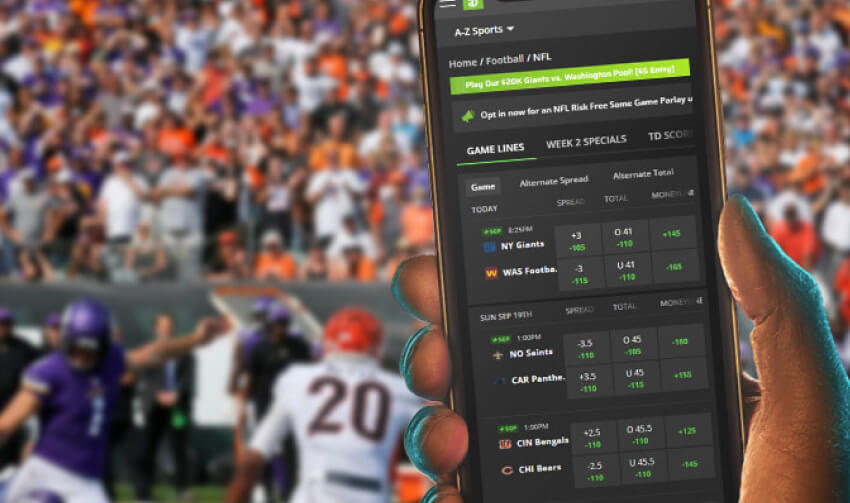Sports and gambling have a long and complex history, and the intersection of these two activities continues to generate controversy and debate. From ancient Greece to modern-day America, sports and gambling have been intertwined in various ways, reflecting the cultural and social norms of their respective eras. While some view sports and gambling as harmless and even enjoyable activities, others see them as a source of social and economic harm.
In recent years, the rise of it has transformed the nature of the intersection between sports and gambling, with online sports betting platforms making it easier than ever for individuals to place bets on sporting events. As the industry continues to evolve, it is essential to ensure that responsible gambling practices are promoted and that vulnerable individuals are protected from the potential risks of it. For more information about online casinos and responsible practices, visit www.bestcasinositesonline.com.

Source: nypost.com
Contents
- The Historical Context of the Intersection of Sports and Gambling: From Ancient Greece to Modern America
- Perceptions and Attitudes Across Time and Place
- The Rise of Online Gambling and its Impact on the Intersection of Sports and Gambling
- The Implications and Controversies of Sports and Gambling
- The Ongoing Evolution of the Intersection of Sports and Gambling
The Historical Context of the Intersection of Sports and Gambling: From Ancient Greece to Modern America
Sports and gambling have been intertwined for centuries, dating back to the ancient Greeks who incorporated betting on athletic contests into their cultural practices. In the Middle Ages, jousting tournaments were a popular form of gambling in Europe, with spectators placing bets on their favorite knights. In America, horse racing became a popular form of it in the 18th century, with wealthy individuals placing large bets on thoroughbred races.
The early 20th century saw the rise of organized sports leagues, including baseball, football, and basketball. These leagues initially opposed it, viewing it as a threat to the integrity of the game. However, by the 1920s and 1930s, sports gambling had become an established part of American culture, with illegal bookmaking operations flourishing across the country.
In the 1960s, the state of Nevada legalized sports betting, creating a legal framework for gambling on sports events. This paved the way for the development of the modern sports betting industry, which has grown rapidly in recent years with the rise of online sports betting platforms. Today, sports gambling is a multibillion-dollar industry that continues to evolve, with new technologies and betting options emerging on a regular basis.

Source: islandecho.co.uk
Perceptions and Attitudes Across Time and Place
The relationship between sports and gambling is not only shaped by historical forces but also by cultural and social norms. Different societies have distinct attitudes towards it, with some viewing it as a harmless pastime and others seeing it as destructive and immoral behavior.
In some cultures, sports, and gambling are intertwined in a positive way, with betting on sporting events seen as a way to demonstrate knowledge and expertise. In other cultures, however, this is stigmatized and viewed as a vice that can lead to addiction and financial ruin.
In America, the perception of sports casinos has evolved over time. While it was once viewed as a seedy and underground activity, it has become more mainstream in recent years, with many states legalizing betting. This shift in attitudes has been driven by a number of factors, including the rise of online gambling and the potential for tax revenue generated by legalizing and regulating the industry.
The cultural context is complex and multifaceted, reflecting the diverse beliefs and values of different societies and subcultures. Understanding these cultural factors is essential for developing effective policies and strategies to promote responsible gambling and protect vulnerable individuals from potential harm.

Source: business.ucf.edu
The Rise of Online Gambling and its Impact on the Intersection of Sports and Gambling
In recent years, the advent of the online casino industry has transformed the landscape of the sports betting industry. Online betting platforms make it easier than ever for individuals to place bets on sporting events, allowing them to do so from the comfort of their own homes or on their mobile devices.
This shift toward it has had a significant impact on the convergence. It has created new opportunities for individuals to engage in betting, with a wider range of betting options and more competitive odds. It has also opened up new markets for sports betting companies, enabling them to reach a global audience and expand their customer base.
Regulators and policymakers are grappling with these challenges, seeking to develop effective strategies to promote responsible gambling and protect vulnerable individuals. This includes measures such as age verification and self-exclusion programs, as well as public education campaigns to raise awareness of the risks associated with it.

Source: sportsbettingdime.com
The Implications and Controversies of Sports and Gambling
The intersection of these have always been a controversial topic, with many stakeholders holding divergent opinions about the potential benefits and risks of betting. While some argue that betting is a harmless pastime that can be enjoyed responsibly, others view it as a dangerous and addictive behavior that should be tightly regulated or prohibited altogether.
One of the primary implications of sports and gambling is the potential for problem addiction. Studies have shown that individuals who engage in sports betting are at a higher risk of developing problems, particularly if they are already vulnerable due to factors such as mental health issues or financial instability. The negative consequences of the problem can be significant, ranging from financial difficulties to relationship breakdowns and even suicide.

Source: telegraph.co.uk
The Ongoing Evolution of the Intersection of Sports and Gambling
A vast range of historical, cultural, technical, and ethical variables have formed the junction of this, which is a dynamic and intricate phenomenon. While betting has a long and storied history, the rise of the online casino industry and the emergence of new technologies have transformed the landscape of the industry, creating both opportunities and challenges for stakeholders.
As we have seen, the implications and controversies of it are significant, ranging from the potential for problem gambling and addiction to the risk of corruption and match-fixing. However, despite these challenges, there is also a growing recognition of the potential benefits of betting, including the ability to generate revenue for sports organizations, support local economies, and provide entertainment for fans.
To ensure that the intersection of this remains safe, fair, and enjoyable for all, it is essential that stakeholders work together to develop effective strategies to promote responsible activity, protect vulnerable individuals, and maintain the integrity of sporting events. This includes measures such as education and public awareness campaigns, self-exclusion programs, and effective regulation and oversight of the industry.
